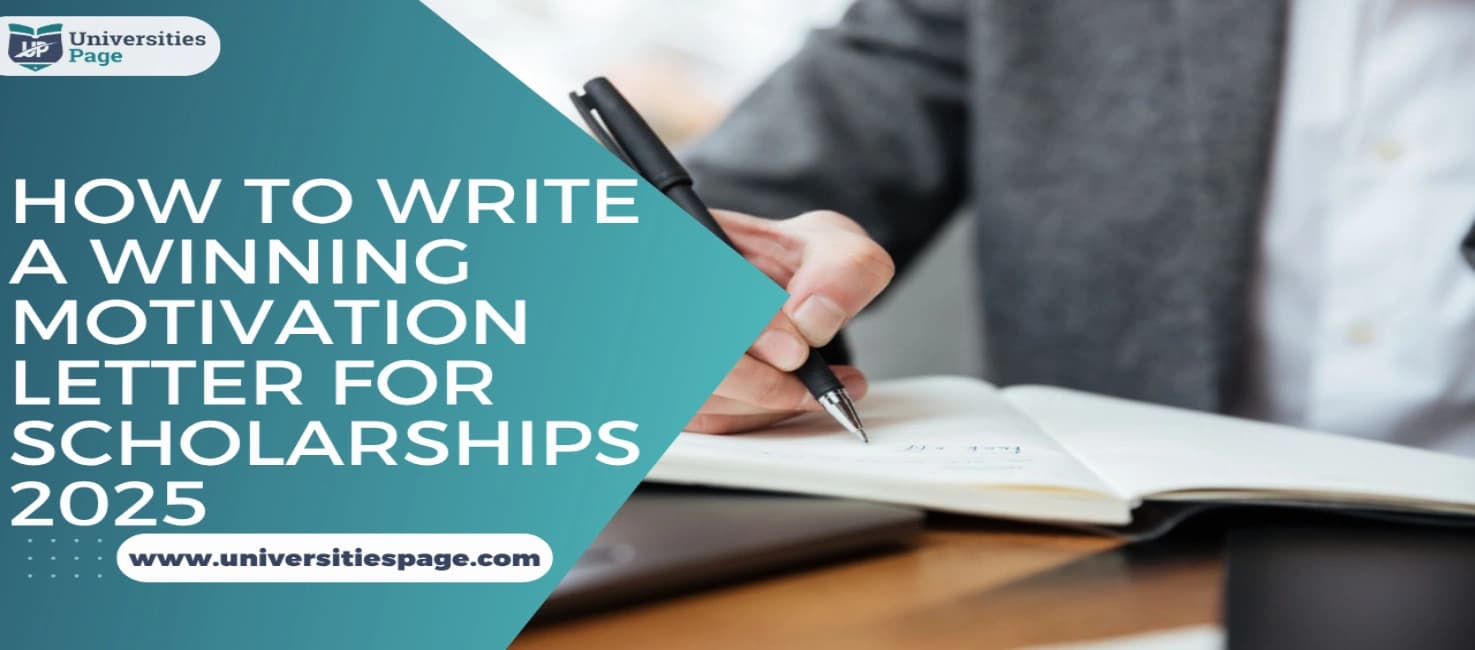Loading article...
Preparing your reading experience
Loading article...
Preparing your reading experience

A
motivation letter is a formal document that’s Usually required when
applying for admission to universities abroad, scholarships, internships,
volunteer positions, and jobs. Motivation is an important document for applying abroad. Many
Students were rejected when they applied abroad because their motivation letter
was weak. A motivation letter is an official document for
the university to complete an application. A motivation letter
for Master's students is a very important for a scholarship
for a master's degree.
When
you start a motivation letter, the wording is easy and simple. The
admission committee easily understands and clarifies all data and checks your
goals and attention. The Motivation letter can explain your absence. There are
lots of students who win scholarships and university admissions even if their
student's CGPA is very low, and the motivation letter shows how to write well
and win scholarships. This is the best motivational letter Sample for
a scholarship given Below.
Related:
Study MBBS in Kazakhstan for Pakistani
Students 2025
To begin, you should begin with a formal greeting,
addressing the recipient by name if possible (for example, "Dear Mr./Ms.
[Last Name]").
To get the reader interested in what you have to say, begin
with a line or anecdote that is intriguing and demonstrates your enthusiasm for
the subject matter.
You should make it very clear that you are applying for a
particular scholarship, and you should briefly highlight the subject that you
are studying.
Please explain what drives you to apply for this scholarship
and how it fits your long-term academic and professional objectives.
Your research and genuine interest in the university or
program should be demonstrated by mentioning specific characteristics of the
institution or program that you find appealing.
Individualize your Introduction so that it reflects your
one-of-a-kind experiences or history that is pertinent to the research.
Please provide a concise thesis statement that encapsulates
your primary reasons for writing the letter and establishes the tone for the
remainder.
Be sure to convey your delight about the chance and its
implications for your future.
To lay the groundwork for additional discussion in the body of your application, briefly highlight any noteworthy accomplishments or experiences relevant to your application.
Your Introduction should be brief, ideally a maximum of a few phrases, so the reader is not overwhelmed by the information.
Avoid using overused phrases or generic assertions;
concentrate on creative views that show your personality.
Use language that exudes self-assurance and demonstrates
your readiness to take advantage of the scholarship opportunity.
Please include a brief connection, if applicable, between
the personal experiences that have molded your academic interests and your
aspirations in approaching this project.
Use the opening to provide hints about topics discussed
further in the letter, such as overcoming obstacles or pursuing passions like
yours.
To conclude your introductory paragraph, you should include
a sentence indicating that you are looking forward to discussing your
qualifications and goals in further detail in the subsequent parts.
Related:
Study in Cyprus-for Pakistani Students
Complete Guideline
For those looking for scholarships or educational
possibilities, winning a motivation letter can bring about a multitude of
perks. Listed below are some of the most important benefits:
To provide a more in-depth understanding of who you are
beyond the scope of your academic records, a motivation letter allows you to
communicate your one-of-a-kind personality, passions, and motivations.
It explains how your ambitions align with the scholarship
provider's or school's values and mission, demonstrates why you are an ideal
applicant, and highlights that you are a good fit for the scholarship.
If you write a well-crafted letter that connects the reader
emotionally, your application will be more memorable than others that may lack
a personal touch.
This opportunity allows you to describe your academic and
career goals clearly and concisely while explaining how the scholarship will
assist you in achieving those goals.
A motivation letter allows you to address gaps in your
experience or qualifications while explaining your dedication to overcoming
such shortcomings.
Your commitment and sincerity in pursuing the scholarship
are demonstrated, which has the potential to impact the individuals who make
the decisions positively.
Writing a compelling motivation letter during the
competitive application process can help you differentiate yourself from other
applicants with similar academic qualifications.
Utilizing the letter, you can highlight experiences that
significantly shape your interests and objectives. This provides context that a
resume might not be able to express.
Creating a letter of motivation helps you improve your
writing and persuasive skills, which are valuable in various contexts,
including academic and professional circumstances.
A letter targeted to your specific needs demonstrates that
you have conducted an extensive study on the scholarship or institution
and are genuinely interested in the opportunity.
It allows you to talk about how you intend to contribute to
the university or field community once you have finished your studies, which
provides further evidence of the potential impact that investing in you could
have.
Because an engaging tale has the potential to leave an
indelible impact on the selection committee, it increases the likelihood that
they will remember you during the debate.
Writing a motivation letter can encourage self-reflection on
your objectives and motivations, helping you better understand what you want to
achieve through your education.
If the letter results in an interview or additional
discussion, there are opportunities to network with faculty members or
scholarship committees.
Those who read your motivation letter may provide you with
future suggestions or support if you do a good job of presenting yourself
through their letter.
Related:
Study in the Czech Republic for Pakistani Students
To,
The Admission Committee, [University Name]
My name is [Your Name]. I am writing to apply
for the Master’s program in [Program Name] at [University's
Name]. This program focuses on [aspects of the intended
program], which will help me [Desired Outcome]. This
program will provide me with skills in [Name 2-3 Skills], and
that’s why I want to join this course.
I completed my [Your Degree] in [Your
Major] at [Your University], where I studied courses
like [List 3-4 Subjects related to intended program]. These courses
gave me a strong understanding of [intended program Concepts and
Skills]. During this degree, I worked on the [Name of Relevant Project] project. This
project taught me [specific applications or skills]. This
experience developed my interest in [Intended Field of Study], and
now, I want to further advance in this field by pursuing a Master's program.
In addition to my studies, I have also gained practical
experience through projects/internships/jobs. I interned/worked at [Company/Organization
Name], where I was responsible for [Briefly Describe Internship
Experience]. This internship/job taught me a lot and gave me practical
skills in [Field or Subject related to the intended course]. These
experiences helped me improve my [Name Technical Skills]. I also
learned to work in a team and solve technical problems.
The reason I'm very interested in the [Program Name] at [University's
Name] is because it offers [2 specific reasons/features of the
program]. I am interested in its modules, such as [Relevant
Modules]. These modules will equip me with the necessary skills in [relevant
skills]. Another reason I want to join this course is
that [Second Reason/Interest] because [Specific
explanation]. Now, I want to contribute to the ongoing work in this
area. [Reason Justification]
My long-term career goal is to work in [Specific
Career Goal or Field mentioned on the website]. I have always been
interested in [ Area of Interest in this Field of Study] and [mention
any educational project or professional experience]. I want to work in
roles that allow me to [Specific Career Aspirations]. This Master's
program in [field of study] will help me to reach these goals.
I am very excited about joining the academic community
at [University's Name]. My educational background, practical
experience, and passion for [Field of Study] make me a strong candidate for
the [Program Name]. Thank you for considering my application.
Yours sincerely,
[Your Name]
Answer: The purpose of your motivating letter is
to describe what motivates you and demonstrate to the reader how you share the
ideals expressed by their organization. Invest some time in conducting an
in-depth study of the organization, including its culture, goals, and the
forces that motivate it. Determine what connects with your ideas and ambitions,
and include it in your writing letter to motivate yourself.
Answer: Your motivation letter will describe
your relevant experience, highlight your strengths, and propose future work to
show the reader why you deserve the award. The opportunity to describe your
goals, explain what you want to do, and demonstrate your potential will be
presented to you now. They are typically between 400 and 700 words in length.
Answer:
Answer: In this letter, I want to convey my
enthusiasm for the [Position/Program] offered by [Name of
Organization/Institution]. With [X years of experience] and a background in [Y
field], I am a highly driven candidate excited about the position. My talents,
qualifications, and enthusiasm make me an outstanding candidate for the post or
program.


Mahnoor is a seasoned visa consultancy professional with over 11 years of hands on experience guiding Pakistani students toward successful study abroad journeys. Her expertise spans international education systems, student visa regulations, and global immigration frameworks, making her a trusted voice in the study abroad industry. Over the past 11 years, Mahnoor has worked closely with students, parents, educational institutions, and international partners to simplify complex visa processes and ensure compliance with ever changing immigration laws. Her deep understanding of country-specific visa requirements enables him to provide accurate, up to date,...
Read moreDiscover more insightful articles about global education and study abroad opportunities
_1771671075407.webp&w=3840&q=75)
Discover if taking a gap year affects your study abroad plans. Find answers to common questions for smooth international admissions.
_1771671096771.webp&w=3840&q=75)
Get answers to common questions on studying abroad with low grades and explore options to achieve your international education goals.
_1771497549260.webp&w=3840&q=75)
Find answers to key questions about eligibility for studying abroad, including academic criteria, language tests, visas, and other requirements for Pakistani students.
Engage with our community of students and education experts. Your insights matter!
Share your thoughts with the community
No approved comments yet. Share your thoughts!